Unique Markets in Thailand, a shopper’s haven, offers a vibrant tapestry of traditional markets and modern bazaars. From the iconic floating markets of Bangkok to the bustling night bazaars of Chiang Mai, Thailand’s markets are a cultural feast. Immerse yourself in the local culture, savor exotic cuisine, and hunt for unique souvenirs as you explore these extraordinary markets. This guide will lead you through the most captivating markets across the country, ensuring you don’t miss these unforgettable experiences.
- 1. Why Visit Thailand’s Unique Markets?
- 2. Iconic Floating Markets in Thailand
- 3. Night Markets That Light Up Thailand
- 4. Unusual and Quirky Markets in Thailand
- 5. Local Markets for Authentic Thai Experiences
- 6. Tips for Shopping at Thailand’s Markets
- 7. Must-Try Thai Street Foods at Markets
- 8. Best Time to Visit Thailand’s Markets
- Conclusion
- FAQs
1. Why Visit Thailand’s Unique Markets?
Thailand’s markets are more than just shopping destinations—they’re vibrant cultural hubs.
Here’s what makes them so special:
- A Culinary Adventure: Savor authentic Thai street food and local delicacies.
- Unique Souvenirs: Discover handcrafted treasures, textiles, and souvenirs.
- Cultural Immersion: Interact with locals and experience their way of life.
- Photographic Opportunities: Capture stunning moments, especially at water markets or night bazaars.
2. Iconic Floating Markets in Thailand
Damnoen Saduak Floating Market (Ratchaburi)
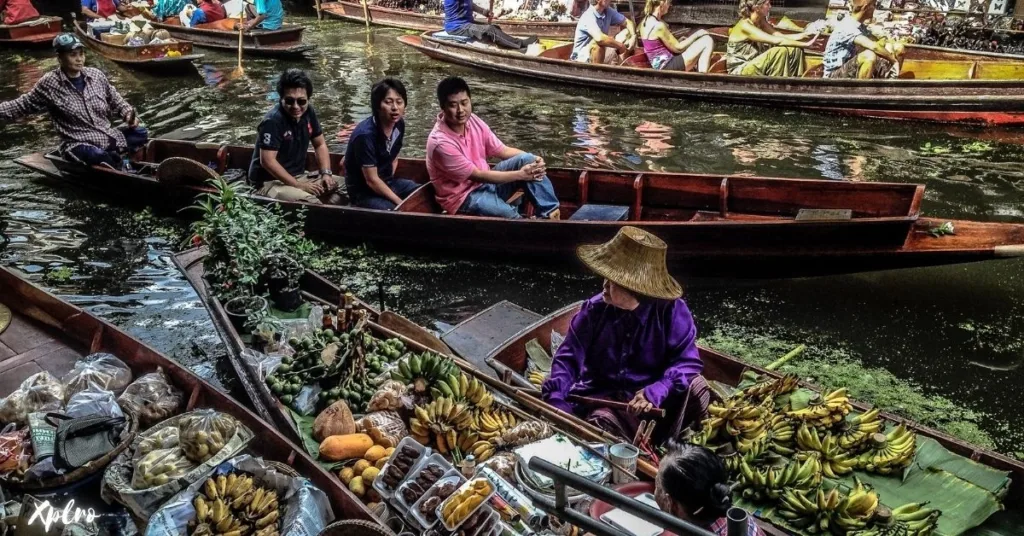
Overview: Thailand’s most famous floating market, featuring colorful boats brimming with fresh produce and local delicacies.
- Highlights: Indulge in mango sticky rice or freshly made coconut pancakes.
- Tip: Visit early in the morning to avoid crowds and experience the market at its busiest.
Amphawa Floating Market (Samut Songkhram)
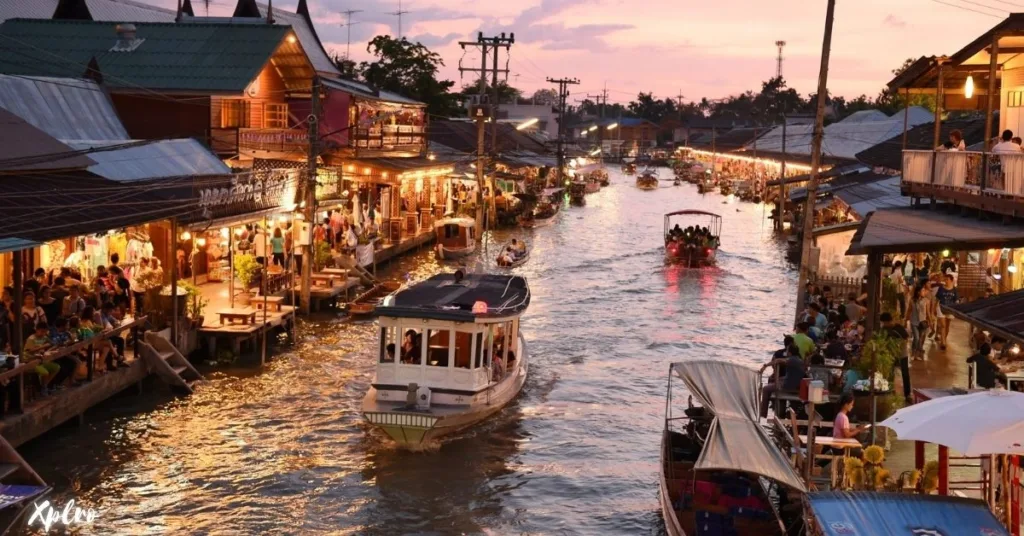
Overview: A popular weekend market located along a canal, offering a unique blend of local culture and delicious food.
- Highlights: Savor freshly grilled seafood while enjoying the scenic canal views.
- Unique Experience: Take a boat ride at night to witness the enchanting glow of fireflies.
Taling Chan Floating Market (Bangkok)
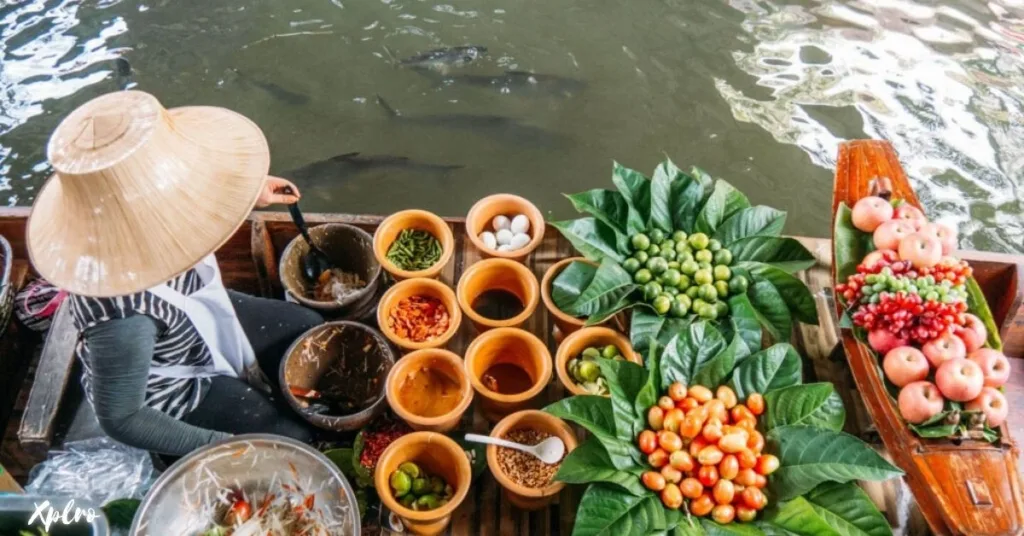
Overview: A smaller, less touristy floating market offering a more authentic experience.
- Highlights: Indulge in fresh seafood from boat vendors or shop for unique handmade crafts.
- Tip: Combine your visit with a trip to nearby Thonburi temples for a cultural experience.
3. Night Markets That Light Up Thailand
Chiang Mai Night Bazaar – Unique Markets in Thailand
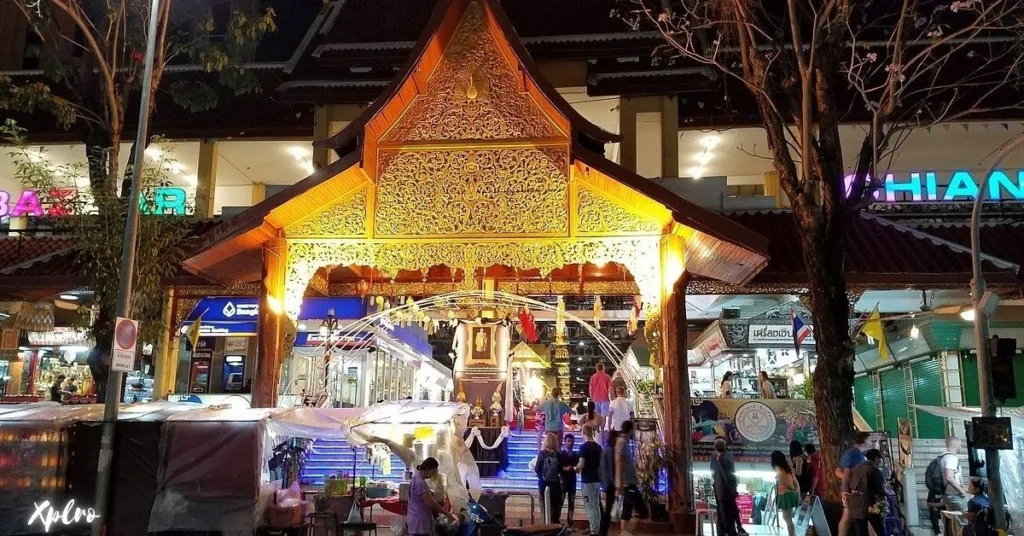
Overview: A bustling night market in the heart of Chiang Mai, offering a diverse range of goods.
- Highlights: Discover handmade jewelry, traditional Lanna-style crafts, and vibrant hill-tribe textiles.
- Tip: Don’t forget to haggle for the best prices!
Asiatique The Riverfront (Bangkok)
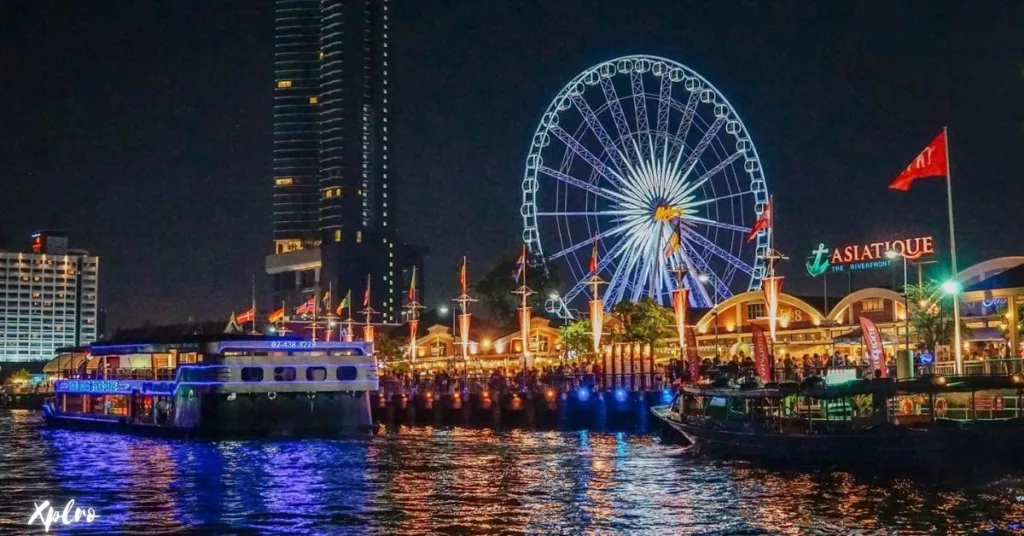
Overview: A modern night market on the banks of the Chao Phraya River, offering a blend of shopping, dining, and entertainment.
- Highlights: Explore trendy fashion boutiques, savor delicious street food, and enjoy stunning views from the iconic Ferris wheel.
- Unique Feature: Witness captivating performances of traditional Thai puppetry.
Sunday Walking Street (Chiang Mai)
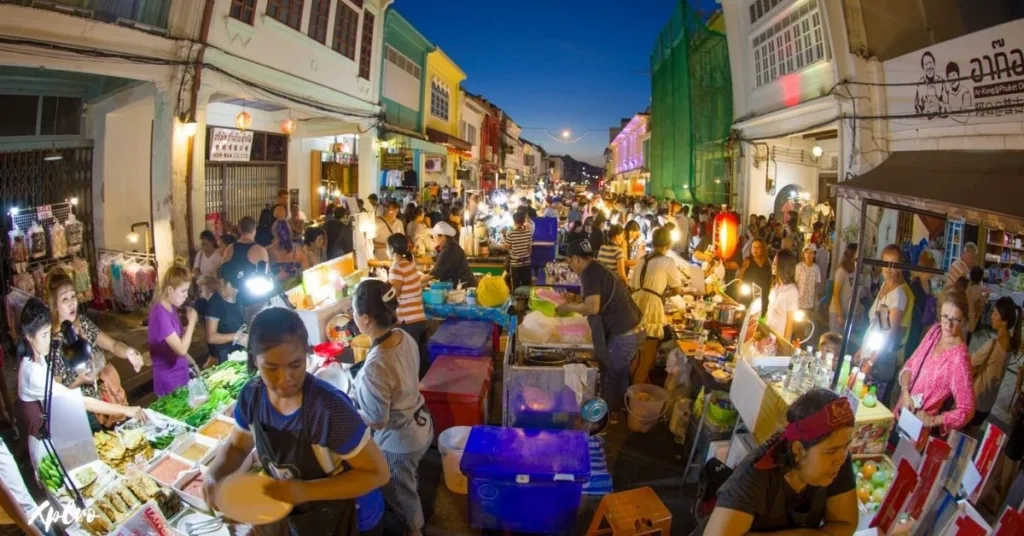
Overview: A sprawling weekend market located in Chiang Mai’s Old City.
- Highlights: Savor the delicious khao soi, a Northern Thai curry noodle dish, and shop for unique souvenirs.
- Tip: Arrive early to experience the market at its best before the crowds gather.
4. Unusual and Quirky Markets in Thailand
Maeklong Railway Market (Samut Songkhram)
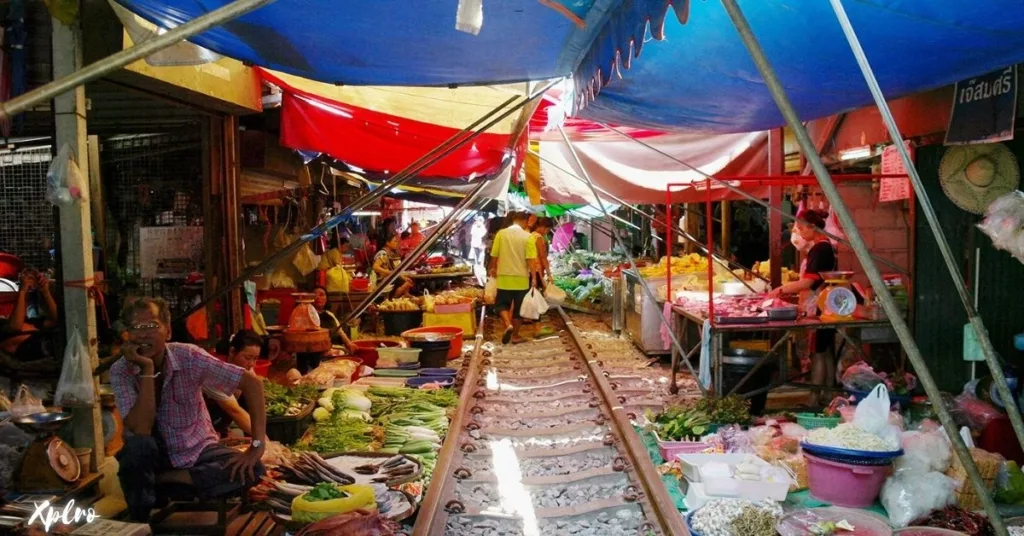
Overview: A unique market built on active railway tracks, where vendors quickly dismantle their stalls when a train approaches.
- Highlights: Witness the thrilling spectacle of a train passing through the market.
- Tip: Check the train schedule to plan your visit and catch the action.
Chatuchak Market (Bangkok)
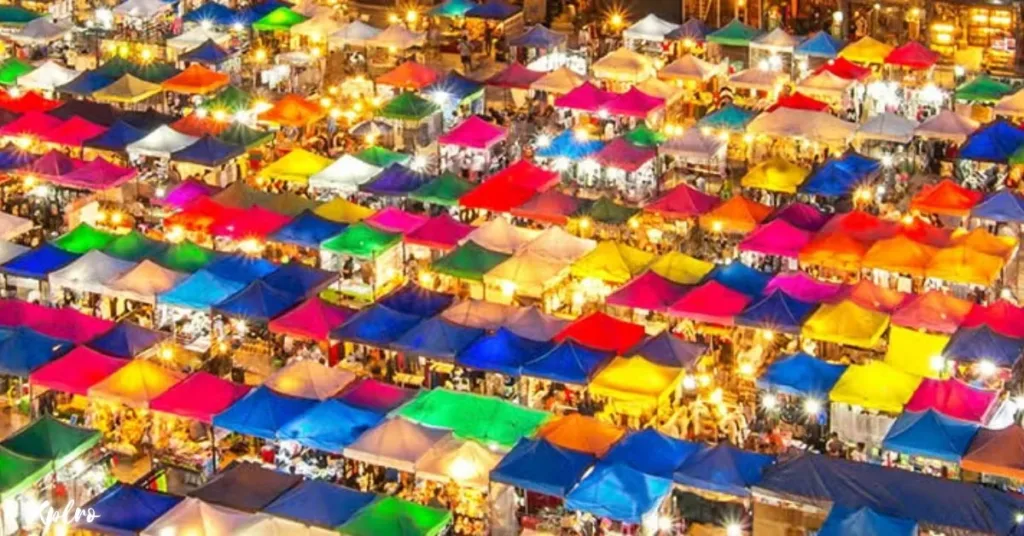
Overview: One of the world’s largest weekend markets, boasting over 15,000 stalls.
- Highlights: A vast array of goods, from antiques and art to plants, pets, and everything in between.
- Unique Feature: Its sheer size and diversity make it a one-stop shop for almost anything imaginable.
Talad Rot Fai (Train Night Market, Bangkok)
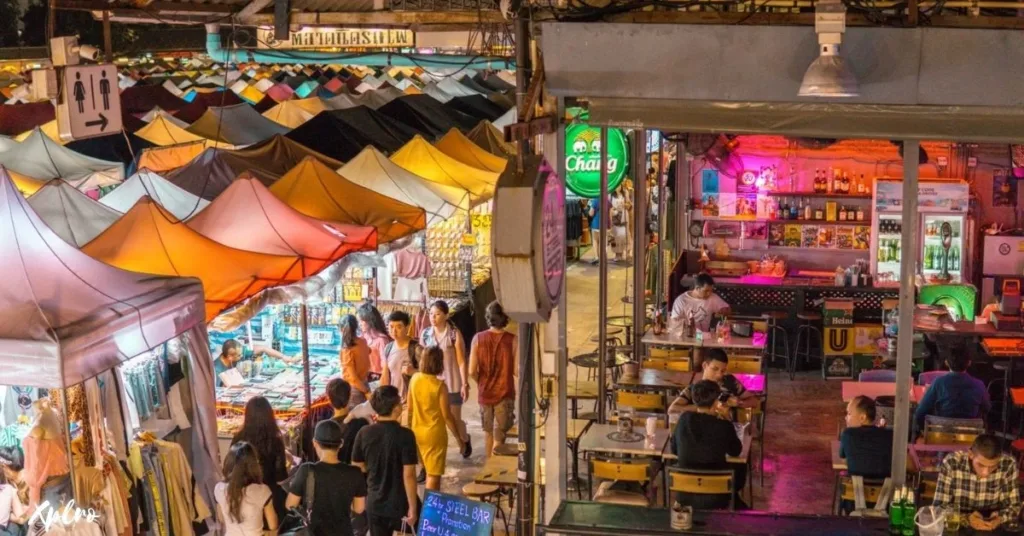
Overview: A retro-themed market filled with vintage collectibles, clothing, and quirky finds.
- Highlights: Explore the vintage zone for unique décor items and retro memorabilia.
- Tip: Don’t miss the street food area for classic Thai dishes.
5. Local Markets for Authentic Thai Experiences
Warorot Market (Chiang Mai) – Unique Markets in Thailand
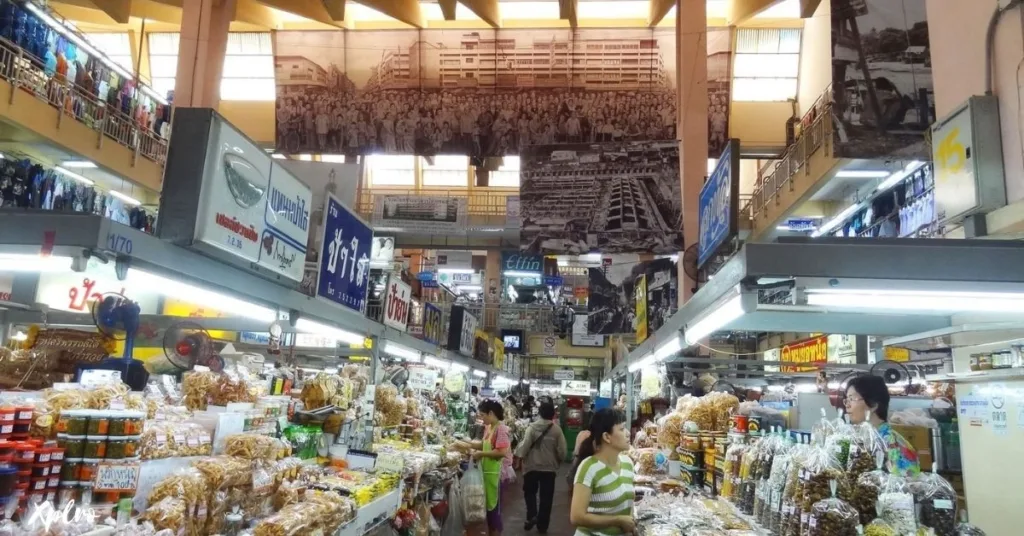
Overview: A local market renowned for its traditional products and delicious street food.
- Highlights: Shop for authentic Northern Thai spices, snacks, and woven goods.
- Tip: Perfect for finding unique gifts and immersing yourself in Chiang Mai’s local life.
Bang Nam Phueng Floating Market (Bangkok)
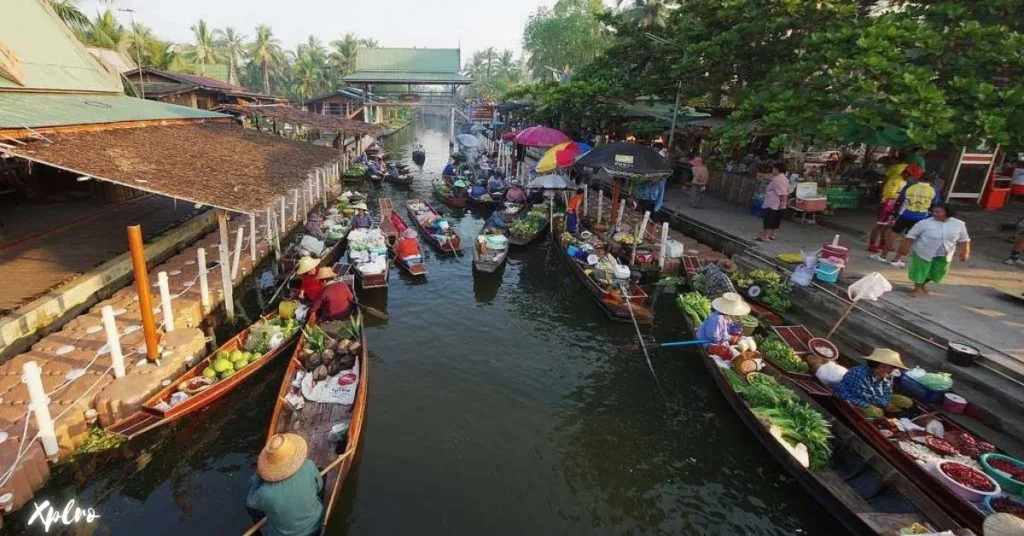
Overview: A quieter floating market nestled amidst lush greenery.
- Highlights: Indulge in homemade sweets, herbal teas, and explore the nearby biking trails.
- Tip: Perfect for a relaxing weekend getaway.
6. Tips for Shopping at Thailand’s Markets
- Cash is King: Most vendors prefer cash payments, especially smaller denominations.
- Stay Hydrated: Keep yourself hydrated, especially in hot and crowded markets.
- Dress Comfortably: Wear light, breathable clothing and comfortable shoes.
- Plan Your Visit: Check the operating days and hours of the market you want to visit.
7. Must-Try Thai Street Foods at Markets
- Pad Thai: A stir-fried rice noodle dish with shrimp, tofu, or chicken, flavored with a sweet, sour, and savory sauce.
- Som Tum: A spicy green papaya salad, packed with flavor and a refreshing crunch.
- Satay: Grilled meat skewers, typically chicken or pork, served with a rich peanut sauce.
- Mango Sticky Rice: A delightful dessert featuring sweet, ripe mango with glutinous rice and coconut milk.
- Thai Iced Tea: A creamy and refreshing beverage with a distinct orange-red color and a sweet, slightly bitter taste.
8. Best Time to Visit Thailand’s Markets
- Floating Markets: Early mornings (6:00 AM – 9:00 AM) offer the best experience, with fresh produce and fewer crowds.
- Night Markets: Evenings (6:00 PM onwards) are ideal for a vibrant atmosphere, lively street performances, and delicious street food.
- Weekend Markets: Plan your visit on weekends to experience the full buzz of markets like Chatuchak and Sunday Walking Street.
Conclusion
Delve into the heart of Thailand’s culture, cuisine, and creativity by exploring its unique markets! From the colorful boats bobbing in Damnoen Saduak to the electrifying energy of Chiang Mai’s night bazaars, each market offers a distinct charm. Whether you crave authentic souvenirs, unforgettable food experiences, or a glimpse into local life, Thailand’s markets promise an unforgettable adventure. Pack your bags, start planning your itinerary on Xplro.com, your trusted travel guide, and get ready to immerse yourself in the vibrant and bustling world of Thai markets!
FAQs
1. What makes Thailand’s markets unique?
- Thailand’s markets are distinct because they offer more than just shopping; they are cultural hubs brimming with life, colors, and traditions. Visitors can immerse themselves in the local lifestyle, enjoy authentic street food, and discover handmade crafts and goods. The diversity of these markets, from floating ones to bustling night bazaars, makes them a must-see experience for travelers.
2. What are the best floating markets to visit in Thailand?
- Floating markets are an iconic part of Thailand’s charm. Among the most popular are the Damnoen Saduak Floating Market, known for its colorful boats and vibrant atmosphere; the Amphawa Floating Market, which comes alive on weekends with delicious seafood and lively canalside stalls; and the quieter Taling Chan Floating Market, perfect for a more authentic and less touristy experience.
3. Are floating markets open every day?
- The operating days of floating markets vary. For instance, the Damnoen Saduak Floating Market is open every day, welcoming visitors throughout the week. In contrast, Amphawa operates only on weekends, while Taling Chan opens exclusively on Saturdays and Sundays. It is always a good idea to check the specific timings before planning your trip.
4. What should I buy at Thailand’s markets?
- Thailand’s markets are treasure troves of unique items. Shoppers can find an array of handmade crafts, intricate textiles, exotic spices, and fresh local fruits. Souvenirs such as carved wooden pieces, colorful ceramics, and traditional Thai snacks are also highly recommended. These markets cater to a wide range of preferences, ensuring there is something for everyone.
5. Is bargaining common at Thai markets?
- Bargaining is a common and expected practice at most markets in Thailand, adding an element of fun to the shopping experience. Vendors typically quote higher prices, leaving room for negotiation. Travelers are encouraged to haggle respectfully, keeping in mind that politeness often yields better deals.
6. Are Thailand’s markets family-friendly?
- Yes, Thailand’s markets are excellent destinations for families. Places like Warorot Market in Chiang Mai and the Amphawa Floating Market are especially suitable for all age groups. Families can enjoy delicious food, browse for souvenirs, and soak in the lively ambiance while exploring these vibrant spaces.
7. What’s the best time to visit floating and night markets?
- The ideal time to visit floating markets is early in the morning, typically between 6:00 AM and 9:00 AM, when the weather is cooler and the crowds are smaller. Night markets, on the other hand, are best visited after sunset when they come alive with dazzling lights, street performers, and a bustling atmosphere.
8. Are there vegetarian food options at these markets?
- Vegetarian travelers will find plenty of options in Thai markets. Popular dishes include pad Thai made with tofu, fresh spring rolls, stir-fried vegetables, and the beloved mango sticky rice. Many vendors are willing to customize dishes upon request, ensuring a satisfying experience for vegetarians.
9. What is the Maeklong Railway Market, and why is it famous?
- The Maeklong Railway Market is renowned for its unique location on active train tracks. Vendors set up their stalls directly on the tracks and quickly move their goods to make way for passing trains. This thrilling and unusual setup draws visitors from around the world, making it one of Thailand’s most iconic markets.
10. Can I use credit cards at Thai markets?
- While some modern markets like Asiatique The Riverfront in Bangkok accept credit cards, most traditional markets primarily deal in cash. Visitors are advised to carry Thai Baht in smaller denominations to facilitate easier transactions with local vendors.
11. Are there eco-friendly markets in Thailand?
- Thailand has several eco-conscious markets that promote sustainability. The Bang Nam Phueng Floating Market, for example, is surrounded by lush greenery and focuses on eco-friendly practices. Additionally, certain markets in Chiang Mai emphasize organic products and handmade crafts, offering an environmentally friendly shopping experience.
12. What’s the largest market in Thailand?
- The largest market in Thailand is the Chatuchak Weekend Market in Bangkok, which spans a staggering 15,000 stalls. This vast market offers an extensive range of goods, including antiques, clothing, home décor, plants, and local street food. Its size and variety make it a top destination for avid shoppers and tourists alike.




